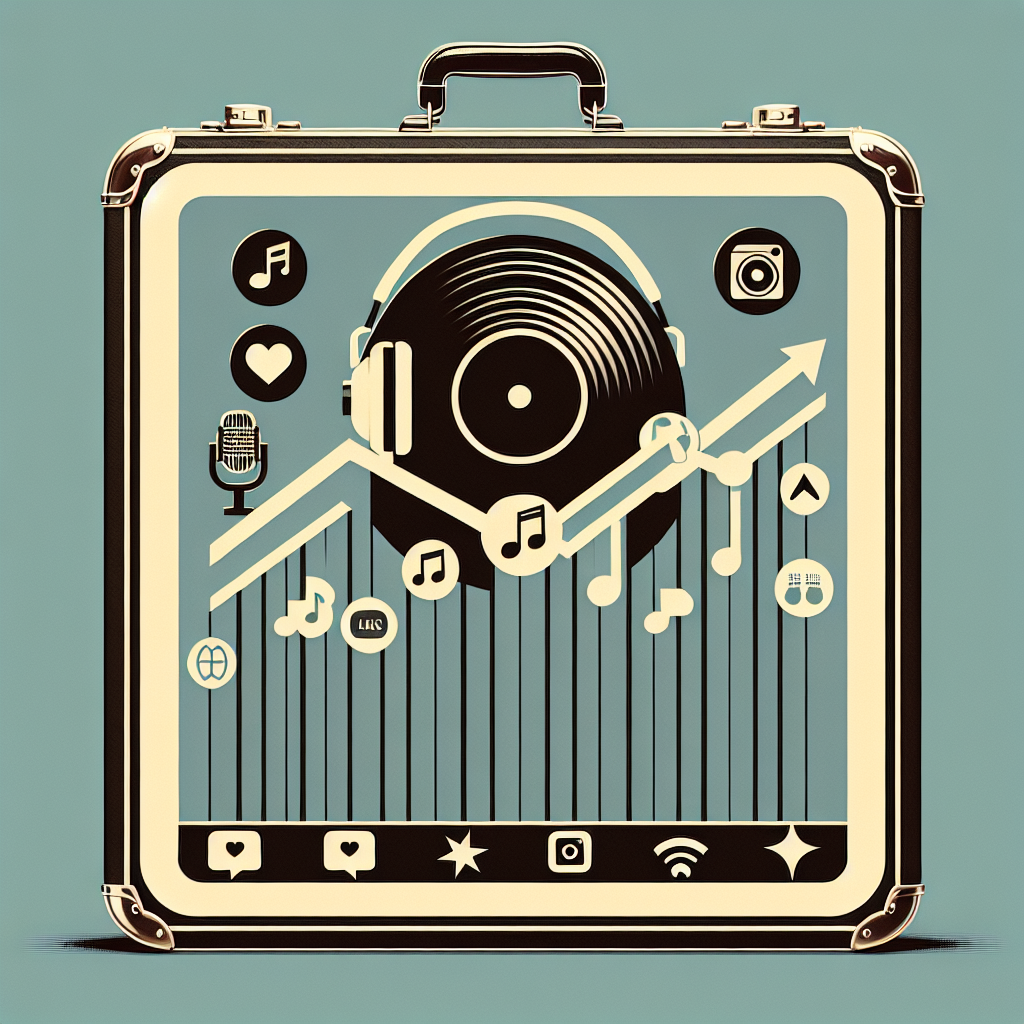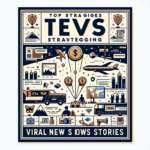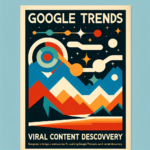A Musical Exploration: Revealing The Power of Data, Social Media & Gen Z Perspective
Ever been curious about the world behind the music we listen to every day? It’s fascinating, and it’s a lot more complex than it might seem at first glance.
Did you know that every time you stream a song, share a track on social media, or even participate in a viral TikTok music challenge, you’re actually contributing to the global music trends? Right! Music is more than just the sound – it’s influenced by digital trends, social behaviors, and data-driven strategies.
This article will offer an educative guide. We’ll explore the modern music landscape ranging from tracking data-driven music trends, the influential role that social media platforms play in music promotion, how Gen Z discovers music, and the innovative ways of marketing music on social media platforms in today’s digital climate. Be ready to gain fresh insights and deepen your understanding of the current music paradigms!
Exploring Current Music Trends
Tracking Music Trends with Data
In today’s digital age, tracking music trends requires tapping into multiple data sources.
These include streaming platforms, social media, and music charts. One effective way to start is by checking popular streaming platforms like Spotify and Apple Music.
- Spotify’s “Top Charts” showcase trending songs and artists.
- Apple Music offers curated playlists highlighting current hits.
Social media plays a vital role. Platforms such as TikTok and Instagram often set the stage for viral hits.
Influence of TikTok on Music
TikTok remains at the forefront of music trends, turning unknown tracks into global sensations.
Short clips featuring catchy tunes frequently go viral, influencing mainstream music charts. Artists often leverage trends by incorporating TikTok challenges in their promotions, which can propel a song to new heights.
Analyzing Billboard and Global Charts
Traditional charts like the Billboard Hot 100 provide insights into popular music.
Here’s a simple way to use these tools:
| Platform | Purpose |
|---|---|
| Billboard Hot 100 | Tracks top U.S. songs weekly |
| Shazam | Identifies songs with high engagement |
Additionally, Billboard’s website offers detailed data on trending artists and genres.
The Power of Playlists
Curated playlists can significantly impact music trends.
Popular playlists on streaming services often highlight emerging artists and new music. Creating or following playlists centered around specific themes or moods can spotlight songs and artists before they hit mainstream charts.
Genre Shifts and Emerging Styles
Pay attention to genre shifts and evolving styles of music.
Genres like lo-fi, synthwave, and hyperpop have gained traction recently. These genres often start on niche digital platforms but quickly grow in popularity through community and influencer support.
Tracking music trends means staying engaged with dynamic platforms. This engagement not only informs but expands one’s musical experience.
Role of Social Media Platforms in Music Promotion
Music Discovery on Social Media
Beyond monitoring trends, social media platforms prove pivotal for music promotion and discovery. Musicians, record labels, and agencies frequently launch new tracks or albums via social media. Platforms like Twitter, Facebook, and Instagram serve as affordable, effective channels designed to reach global audiences.
- Twitter’s retweet function spreads music quickly and widely.
- Facebook’s ‘Share’ capabilities allow fans to circulate their favourite songs.
These platforms are integral for organizing album launches, music tours, special deals, and more.
Direct Fan-Musician Interaction
Social media platforms facilitate direct fan-musician interaction. Artists may host live sessions, Q&A’s, or virtual concerts. These activities not only promote their work but engender a deeper connection with fans. The direct engagement enhances fan loyalty, which in turn amplifies the spread and impact of the artists’ music.
Social Media Analytics in Music Management
In the music industry, social media analytics play a pivotal role. They provide valuable insights into listener demographics, preferences, and behavior. This information helps artists and record labels tailor their marketing strategies.
| Social Media Platform | Analytics Possible |
|---|---|
| Facebook Insights | Tracks post engagements, reach, and demographic data |
| Instagram Analytics | Monitors the performance of posts, stories, and follower activity |
Many artists and record labels leverage these analytics to gauge track popularity and plan future releases.
Fan-Driven Campaigns on Social Media
Fans, empowered by social media, have a larger role in shaping music trends. They can launch campaigns advocating for their favorite artists, promoting specific songs, or encouraging radio play. These fan-drives often manifest in trending hashtags, fan-made content, or global streaming parties, significantly influencing music chart outcomes.
Artist Development through Social Media
Emerging artists have turned to social media platforms to reach audiences and develop their career effectively. Platforms like SoundCloud or Bandcamp enable new artists to share their music, gain feedback, and grow their fanbase. Many of today’s well-established artists found initial success here, further reinforcing the profound impact social media has on the music industry.
How Gen Z Discovers Music
Streaming Platforms and Algorithmic Recommendations
Gen Z primarily interacts with music through digital streaming platforms like Spotify, Apple Music, and YouTube. These platforms use algorithms to recommend music based on user preferences, past listening habits, and trending tracks.
- Spotify’s “Discover Weekly” curates playlists tailored to individual tastes.
- Apple Music’s “For You” section suggests songs and artists based on listening history.
- YouTube’s “Mixes” are generated through user engagement and video history.
By constantly interacting with these recommendations, Gen Z remains perched on the cutting edge of musical trends.
Influence of Short-Form Video Platforms
Beyond TikTok, platforms like Instagram Reels and Snapchat Spotlight are notable for introducing Gen Z to new music. These platforms allow users to add music to their videos:
- Instagram Reels lets users explore featured songs that often gain traction.
- Snapchat Spotlight allows music to be paired with viral video content.
These platforms make music discovery organic as young users engage with them daily.
Role of Influencers and Content Creators
Influencers and content creators significantly impact the music taste of Gen Z. These individuals often promote tracks or artists either through partnerships or personal preferences:
- Music is commonly featured in vlogs, tutorials, and lifestyle content.
- Some influencers create custom playlists shared across their follower base.
This form of promotion often transcends traditional advertising, providing a more authentic discovery experience.
Community-Based Music Apps
Apps like SoundCloud and Bandcamp offer platforms for Gen Z to discover emerging artists and independent music. These apps foster a community that values the exploration of unique sounds.
- SoundCloud is popular for unofficial releases and remixes.
- Bandcamp offers direct artist support, allowing users to purchase and download music.
These platforms emphasize genre diversity and global accessibility.
Impact of Online Communities and Forums
Online communities and forums, such as Reddit and Discord, offer spaces for Gen Z to share music recommendations and discoveries. These spaces enable dialogue about hidden gems, new artists, and niche genres:
- Reddit’s r/Music and r/indieheads are popular for sharing music recommendations.
- Discord servers dedicated to music create space for real-time conversation.
By participating in these communities, Gen Z connects with like-minded listeners, further enhancing their music discovery process.
Marketing Music on Social Media in Today’s Climate
Using Platform-Specific Strategies
Each social media platform has its strengths and suits different types of content and strategies. Tailor your music marketing strategy for maximum engagement:
- Instagram: Utilize Stories, Reels, and IGTV to showcase behind-the-scenes content, live performances, and short music clips.
- YouTube: Create music videos, lyric videos, or live sessions. Engage with fans using YouTube’s community tab and comments section.
- Twitter: Use trending hashtags and participate in cultural conversations. It’s a platform for real-time updates on releases and music industry events.
Engagement through Direct Fan Interaction
Fans crave direct interaction, and social media provides artists the chance to connect authentically.
- Instagram Live: Host interactive Q&A sessions, live jam sessions, or album listen-alongs.
- Twitter Spaces: Use this feature for virtual concerts or discussions about music inspirations and stories.
These interactions foster a community atmosphere, enhancing fan loyalty and word-of-mouth promotion.
Leveraging Influencers and Collaborations
Influencer marketing can be a powerful tool in reaching new audiences.
- Collaborate with influencers whose audiences align with your music style.
- Consider joint live sessions or cross-promotions to tap into larger fan communities.
This strategy is amplified by trending platforms where younger audiences are more present, such as Instagram and TikTok.
Analyzing Music Performance with Social Media Metrics
Social media analytics can guide your marketing strategies. Each platform offers tools to measure engagement and relevance.
| Platform | Key Metrics |
|---|---|
| Tweet impressions, retweet and like counts | |
| YouTube | Views, watch time, subscriber growth |
These metrics guide you on which content resonates most, helping refine future campaigns.
Trends and Innovations to Consider
Music marketing continues to be shaped by technological advances and user behaviors.
- Virtual Reality (VR) Concerts: They are becoming popular, offering immersive experiences for fans.
- Augmented Reality (AR) Filters: Use AR on platforms like Instagram and Snapchat to promote upcoming tracks creatively.
Adjusting strategies to include these innovations keeps your marketing relevant and engaging.
Engaging fans with tailored content and utilizing platform nuances can greatly enhance your music’s reach and impact. For further guidance, Hootsuite’s insights on social media trends offer extensive resources and updates.
Wrapping Up: Current Music Trends and Social Media’s Role
As we’ve explored, the digital age has heavily influenced music trends and discovery. Streaming platforms such as Spotify and Apple Music play significant roles in this, with their curated playlists and top charts aiding listeners in tracking popular and emerging artists.
TikTok, too, has become a powerful player in shaping music trends by turning unknown tracks into viral hits. Traditional music charts, social media platforms, and genre shifts also contribute to the changing landscape of music trends.
Meanwhile, the power of social media in music promotion and discovery is undeniable. From direct fan-musician interaction to fan-driven campaigns, social media has markedly changed the way we experience music. Its influence extends to Gen Z’s music discovery practices and the marketing strategies of musicians and record labels.
Frequently Asked Questions – FAQs
How do streaming platforms influence music trends?
Streaming platforms shape music trends through charts tracking popular songs and artists, and their curated playlists that highlight emerging artists and new music.
What role does TikTok play in music trends?
TikTok has a major influence on music trends as it has the power to turn unknown tracks into global hits. Viral clips featuring catchy tunes can influence mainstream music charts.
How do artists use social media for music promotion?
Artists use social media platforms for direct interaction with fans, promoting new tracks or albums, organizing events, and receiving valuable insights from social media analytics.
How does Gen Z discover new music?
Gen Z primarily discovers new music through streaming platforms, short-form video platforms, influencers, community-based music apps, and online communities and forums.
What are some effective strategies for marketing music on social media?
Effective strategies include using platform-specific approaches, engaging fans through direct interaction, leveraging influencer collaborations, utilizing analytics, and staying current with trends and innovations such as VR concerts and AR filters.






